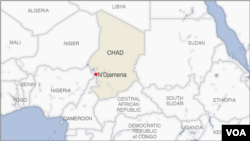A group of 44 suspected members of Boko Haram, arrested during a recent operation against the jihadist group, have been found dead in their prison cell, apparently poisoned, Chad's chief prosecutor announced Saturday.
Speaking on national television, Youssouf Tom said the 44 prisoners had been found dead Thursday.
An autopsy carried out on four of the dead prisoners revealed traces of a lethal substance that had caused heart attacks in some of the victims and severe asphyxiation in the others, he said.
The dead men were among a group of 58 suspects captured during a major army operation around Lake Chad launched by President Idriss Deby Itno at the end of March.
"Following the fighting around Lake Chad, 58 members of Boko Haram had been taken prisoner and sent to Ndjamena for the purposes of the investigation," said Tom.
"On Thursday morning, their jailers told us that 44 prisoners had been found dead in their cell," Tom said, adding that he had attended the scene.
"We have buried 40 bodies and sent four bodies to the medical examiner for autopsy." An investigation was ongoing to determine exactly how the prisoners had died, he said.
A security source, speaking on condition of anonymity told AFP that "the 58 prisoners were placed in a single cell and were given nothing to eat or drink for two days.”
Mahamat Nour Ahmed Ibedou, secretary general of the Chadian Convention for the Protection of Human Rights (CTDDH), made similar accusations.
Prison officials had "locked the prisoners in a small cell and refusing them food and water for three days because they were accused of belonging to Boko Haram," Ibedou told AFP. "It's horrible what has happened."
The government denied the allegations.
"There was no ill-treatment," Chad Justice Minister Djimet Arabi told AFP by telephone.
"Toxic substances were found in their stomachs. Was it collective suicide or something else? We're still looking for answers," he said, adding that the investigation was still ongoing.
One of the prisoners was transferred to hospital on Thursday, but he was "faring much better" and had rejoined "the other 13 prisoners still alive and who are doing very well," the minister said.
Earlier this week, the minister told AFP the captured men had been transferred to Ndjamena on Tuesday evening and handed over to the court system for trial.
The military operation against Boko Haram killed more than a thousand of the group's militants and cost the lives of 52 soldiers, a Chadian army spokesman said. The operation ran from March 31 to April 8.
It was launched in response to a devastating attack on Chadian troops on March 23 on a base at Bohoma, in the Lake Chad marshlands, that killed 98 soldiers. It was the largest one-day loss the army had ever suffered.
Since then, Idriss has warned his allies in the region that Chad's army will no longer take part in operations outside the country.
The force, considered one of the best in the region, has fought Boko Haram in the Lake Chad region as part of the Joint Multinational Force with Nigeria, Cameroon and Niger.
But on Friday, French Defense Minister Florence Parly said Chad remained committed to the G5 Sahel anti-jihadist force operating in the region.




